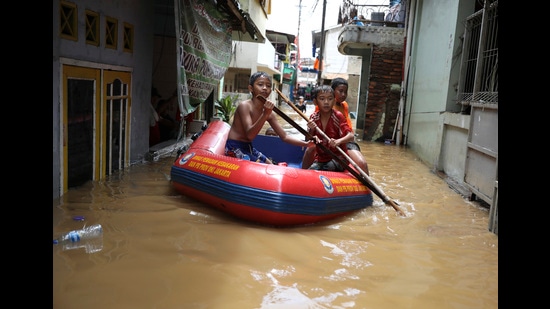Policies and People | Jakarta to Nusantara: Lessons for other megacities
Indonesia is relocating its capital from Jakarta to Nusantara. One of the main reasons for this move is the degraded environment of the present capital. Other mega cities must take note and invest in environmental protection and climate resilience
Last week, Indonesia’s House of Representatives approved a bill to relocate the nation’s capital from Jakarta in Java to East Kalimantan in Borneo. The new capital will be called Nusantara. Indonesian President Joko Widodo had announced the relocation plan in 2019, but the process got delayed due to the coronavirus pandemic.

The Indonesian government has given several reasons for its decision to relocate the capital to Nusantara, about 2,000km north-east of Jakarta.
First, the government wants to redistribute wealth. Java is home to 60% of the country’s population and more than half of its economic activities, even though Kalimantan is almost four times bigger.
Second, the strategic location of Nusantara. In a speech in 2019, Widodo said: “The location is very strategic – it’s in the centre of Indonesia and close to urban areas… the burden Jakarta is holding right now is too heavy as the centre of governance, business, finance, trade and services.”;
Third, Jakarta faces several environmental challenges. The climate crisis will only aggravate them. The new capital, the government has promised, will be a “low-carbon superhub.”
The climate challenge
Jakarta has been the nation’s capital since the country became independent in 1949. In the course of time, the city has become overcrowded and polluted. The capital has been consistently ranking as one of the most-polluted cities in the world for years. Jakarta, which has a population of around 10 million, is also sinking. The northern part of the city, which meets the Java Sea, has been sinking 25 centimetres a year.
Moreover, Jakarta does not have access to clean over-ground water. It depends on borewells to extract groundwater for its population. Increasing population has led to overdrawing of the natural resource, leading to land subsidence in many areas. Another big woe is regular flooding. The city is built on a delta but 40% of it is below sea level. This combined with sea-level rise and an inefficient water management system lead to regular flooding.
A World Bank report has warned: “Jakarta is now highly vulnerable to impacts of climate change. The greatest climate and disaster-related risk facing Jakarta is flooding, which imposes very high human and economic costs on the city. Forty percent of the city’s area, mostly in the north, already lies below sea level, and is thus vulnerable to tidal flooding, storm surges, and future rises in sea-levels. Both total rainfall and the intensity of rainfall events have increased, while rising global temperatures and the urban heat island effect have increased average temperatures.”
In 2021, United Kingdom-based business risk consultancy Verisk Maplecroft’s ranking dubbed Jakarta as the “worst-performing city in the ranking”, followed by Delhi. The report studied the world’s 576 largest cities.
“With rising emissions driving weather-related risk and populations growing in many cities across the developing world, the risks to citizens, real assets and commercial operations are only going to rise,” the report warned.
Nusantara: A wise move?
However, the government’s decision to move the capital has not made everyone happy, especially environmentalists. This is because Borneo, where the new capital will be built, is rich in flora and fauna. Moving the capital to East Kalimantan, they warned, would lead to massive destruction of rainforest and put the habitat of orangutans, sun bears and long-nosed monkeys in danger and damage the ecosystem.
They have every reason to worry.
Indonesia environmental record when it comes to conserving forests has been dubious. The country is the world biggest producer of palm oil, which is used in wide range of goods, ranging from processed foods to cosmetics and biodiesel.
But production of palm oil, which India is now promoting in the ecologically fragile Northeast and the Andaman and Nicobar Islands, has led to clearing of tropical rainforests, burning of peatlands, destruction of endangered wildlife habitat, land conflicts with indigenous and traditional communities, and labour rights abuses. During a reporting trip to Indonesia in 2009, I witnessed the disastrous environmental and social impacts that palm oil plantations have had in Borneo.
Cities must learn from Jakarta
Jakarta is not the only big city facing such environmental crises. Almost all mega cities, especially those in the developing world, have a similar set of problems depending on their geographical locations.
The relocation of the Indonesian capital is a lesson for all cities: Cities must learn to live and grow sustainably and invest in nature-based solutions, which uses ecosystems to mitigate pollution, reduce risks from floods and storms and provide healthy air, water, food and living conditions so that they can find the right balance between their economic, sociological and ecological needs.
The views expressed are personal
Continue reading with HT Premium Subscription





